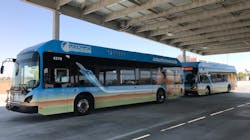AVTA electric buses reach two-million-mile mark
The Antelope Valley Transit Authority’s (AVTA) 49 electric buses collectively accumulated two million service miles on Dec. 24, 2019. The authority passed the one million service mile mark in May 2019. AVTA says the feat is a step toward its goal to become the nation’s first all-electric bus fleet.
“Thus far, approximately 512,821 gallons of diesel fuel have been saved with the new battery-electric fleet. This equates to a net savings of $801,190 in fuel costs after paying for electricity,” said AVTA Chairman of the Board Marvin Crist. “Even more impressive, those two million all-electric miles represent a carbon footprint reduction of more than 12 million pounds of CO2 and 29,063 pounds of particulate matter."
The AVTA Board of Directors awarded a five-year contract for electric buses to BYD in February 2016. The buses are charged using wireless inductive charging systems. AVTA says the use of these technologies has created a smarter, greener and more interconnected transit system, which serves the Antelope Valley and areas extending south into the Los Angeles basin and north to Edwards Air Force Base and the Mojave Air and Space Port.
“AVTA actively operated 88 buses during December 2019, over half of which are zero-emission buses,” stated AVTA Executive Director and CEO Macy Neshati. “Those 49 BYD electric buses, manufactured right here in the Antelope Valley, just completed two million miles of travel. Our goal from the start was to be the first transit agency to implement electric bus technology on a broad scale, and we have met that goal.”
About the Author

Mischa Wanek-Libman
Group Editorial Director
Mischa Wanek-Libman is director of communications with Transdev North America. She has more than 20 years of experience working in the transportation industry covering construction projects, engineering challenges, transit and rail operations and best practices.
Wanek-Libman has held top editorial positions at freight rail and public transportation business-to-business publications including as editor-in-chief and editorial director of Mass Transit from 2018-2024. She has been recognized for editorial excellence through her individual work, as well as for collaborative content.
She is an active member of the American Public Transportation Association's Marketing and Communications Committee and served 14 years as a Board Observer on the National Railroad Construction and Maintenance Association (NRC) Board of Directors.
She is a graduate of Drake University in Des Moines, Iowa, where she earned a Bachelor of Arts degree in Journalism and Mass Communication.
